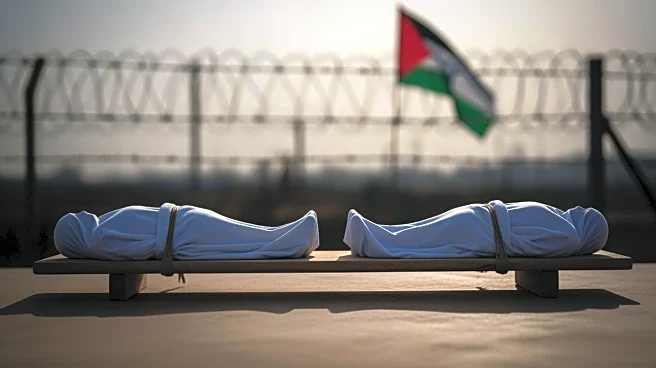What's Happening?
Israeli authorities have confirmed the identification of the bodies of hostages Eitan Levy, Tamir Nimrodi, and Uriel Baruch, who were returned from Gaza. These individuals were abducted by Hamas during
the October 7, 2023, assault. The Abu Kabir Institute of Forensic Medicine verified the identifications early Wednesday. Eitan Levy, described as a devoted family man, was missing for over 40 days before being confirmed as a hostage. His body was returned for a proper burial, providing some relief to his family after years of uncertainty. Tamir Nimrodi, an IDF soldier, was classified as a hostage in critical danger and was later killed in captivity. His father announced the return of his body with deep sorrow. Uriel Baruch, kidnapped while driving home from a music festival, is survived by his family, who expressed their grief and relief at his return. The recovery effort is ongoing, coordinated with international mediators, and the process of locating and identifying all remains is expected to take time.
Why It's Important?
The identification and return of these hostages' bodies mark a significant moment for the families involved, providing closure after years of uncertainty and anguish. This development highlights the ongoing humanitarian and diplomatic challenges in the region, as efforts continue to recover and identify all hostages. The situation underscores the complex geopolitical dynamics involving Israel, Hamas, and mediators like Qatar, Turkey, and Egypt. The return of these bodies may influence public sentiment and policy decisions in Israel, potentially affecting future negotiations and security measures. The broader implications include the impact on regional stability and the humanitarian efforts required to address the aftermath of such conflicts.
What's Next?
The recovery process is expected to continue, with Israeli officials estimating that roughly half of the remaining slain hostages are still in Gaza. The identification and return of bodies are being coordinated with Qatari, Turkish, and Egyptian mediators, indicating ongoing diplomatic efforts. Families of the hostages and the Israeli government may push for further negotiations to ensure the return of all hostages. The situation may lead to increased international attention and pressure on Hamas to disclose information about the remaining hostages. Additionally, the Israeli government may consider revising its strategies and policies regarding hostage recovery and negotiations.
Beyond the Headlines
The return of hostages' bodies from Gaza raises ethical and legal questions about the treatment of hostages and the responsibilities of involved parties. It highlights the emotional and psychological toll on families awaiting news of their loved ones. The situation may prompt discussions on international humanitarian law and the rights of hostages in conflict zones. Long-term shifts could include changes in diplomatic relations and strategies for conflict resolution in the region. The event also serves as a reminder of the human cost of geopolitical conflicts and the need for comprehensive peace efforts.









